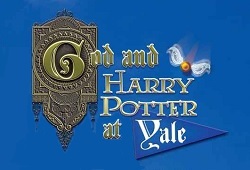
During the first decade of the twenty-first century, a most unusual event occurred in the United States, not once but on six documented occasions – books from the popular Harry Potter series were burned in giant bonfires. The reason for such strong, negative reactions to a popular work of fiction was both obvious as well as head scratching, namely that the books had been deemed anti-Christian.
“Behind that innocent face is the power of sinister darkness,” one book burning organizer explained. “Harry Potter is the devil and he is destroying people.”
“Let me say something about Harry Potter,” another added. “Warlocks are enemies of God. And I don’t care what kind of hero they are, they are an enemy of God, and had it been in the Old Testament, Harry Potter would have been put to death. You don’t make heroes out of warlocks.”
For Yale University graduate student Danielle Elizabeth Tumminio, such outcries by the Christian community were misguided. Yes, the fictional Harry Potter practiced witchcraft, but that was just one sliver of the world author J.K. Rowling had created. Just as it’s impossible to judge a book based on one random chapter, dismissing the Harry Potter series as anti-Christian because of one solitary aspect missed both the point and meaning of the larger narrative.
Tumminio herself was a Christian and fan of Harry Potter. After receiving her undergraduate degree in English Literature from Yale University, she went on to pursue a master’s degree in Theology, and those two disciplines inevitably dovetailed. In 2010, the now Reverend Danielle Elizabeth Tumminio published God and Harry Potter at Yale, which detailed her efforts at both creating and teaching a Harry Potter and Theology hybrid seminar during the spring of 2008.
Tumminio proposed the course not only because she believed many theologians were misinterpreting Harry Potter, but also as a way to attract college students who would not normally enroll in a Theology class. After Tumminio’s proposal was given the green light, seventy-nine students applied to fill the eighteen open enrollment slots. As expected, very few of them were expressly interested in Theology and were instead motivated by the impact that Harry Potter had already played in their lives.
“These Yalies were the first generation of young people to grow up alongside the Harry Potter series, and the books were an important part of their development,” Tumminio writes in God and Harry Potter at Yale. “For some, Cedric’s murder was their first exposure to death; for others, Hermione’s tears over Ron were their introduction to heartbreak.”
Because the seminar was meant as a Theology course on Christianity, Danielle Tumminio broke the course into topics directly associated with Christian thought, including sin, sacrifice, and salvation. The philosophical meanings of these concepts were then compared against the Harry Potter texts, often with mixed results. Some were firmly rooted in the narratives, while others merely alluded to or were entirely lacking. Enough overlay existed, however, to spur a meaningful discussion even when a concept was less noticeable in Harry Potter.
Sacrifice is a prime example. From the Christian perspective, the concept relates to Jesus sacrificing his life to obtain forgiveness from God for human sins. There are many examples of sacrifice in the Harry Potter books – such as the deaths of Lily Potter, Dumbledore, and even the house elf Dobby – but none that directly relate to that of Jesus, including Harry Potter’s own willingness to sacrifice his life in Harry Potter and the Deathly Hallows.
“What our investigation showed is that many characters may share certain aspects of Christ’s sacrifice, but none is a perfect match,” Danielle Tumminio explains in God and Harry Potter at Yale. “Each has substantial limitations when we look at the motive and accomplishments of these gifts. Yet I would like to suggest that reading Christ’s character and work into the series is not as simple as looking for a single person who fits all the criteria of Jesus. Instead, we find that the net effect of Christ’s sacrifices are fulfilled using a variety of characters.”
In that sense, it was Lily’s sacrifice that instilled in Harry the willingness to later sacrifice his own life, while Dumbledore’s sacrifice taught him that there are things worth dying for. Even Dobby’s death helped Harry Potter on his quest, as it provided motivation to continue at a time when giving up seemed easier.
“The identity and work of Christ are alive and vibrant in Harry Potter, but they are not represented through a single person,” Tumminio concluded. “They are brought to life by the contributions of an entire community, as if to say that if the world is going to be dominated by love and tolerance, then the whole world needs to work together towards achieving those ends. This may be a departure from the typical way in which the Christian story is depicted, but it is my sense that Rowling’s writing is not antithetical to it.”
At a time when others within the Christian community could only see Harry Potter as a heretic wizard, Danielle Elizabeth Tumminio saw past that microscopic interpretation and realized the inherent meaning of Harry Potter from a Christian perspective. As she explains in God and Harry Potter at Yale, however, it was never her intention to convert any of her students to Christianity, only to demonstrate that the questions which dominate theological thought offer a deeper understanding of the world regardless of one’s faith.
By combining those two viewpoints – beliefs in both Theology and Harry Potter – she created a course at Yale University that not only defied the odds but succeeded on a multiple of levels as well.
Anthony Letizia

